2023 IGDF Conference held in Canada -Research Presentations Spur International Cooperation-
2023. 8. 7
News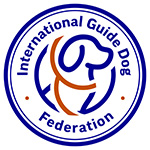
The IGDF Conference was held in Vancouver, Canada, from April 27-30, 2023. It was a valuable opportunity to exchange information directly across countries and organizations through a variety of research presentations on guide dogs. This year, 275 staff members of the IGDF from 84 guide dog member organizations in 30 countries and regions attended the conference.
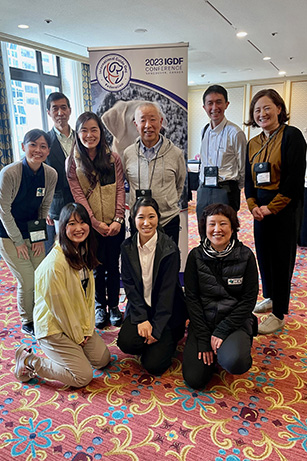
Group photo of JGDA staff members who attended the conference
Among the 24 research presentations on training techniques, puppies, and other topics, JGDA presented the following three presentations:
Presentation 1
- Free Feeding for the Dams to Improve Health Concerns
Presenter: Akane Motooka, Training Department
Presentation 2
- SDGs Surfing the Diversity Generation
Presenter: Yuko Inoue, International Affairs
Presentation 3
- Social Barrier Our Guide Dog Users Face
Presenter:
Mika Anbo, Public Relations & Communications Department,
and Yoshiyuki Yamaguchi, Chief Executive Director
Interview with three presenters at the IGDF conference.
Presentation 1
Theme
Free Feeding for the Dams to Improve Health Concerns
Presenter
Akane Motooka, Training Department
Summary of Presentation
Health management of dams during the whelping and nursing period is essential for the healthy growth of puppies. We presented a feeding method called "free feeding," which Fuji Harness has been working on to improve dams' physical condition and prevent weight loss.
*Free feeding: Before free feeding, we have been feeding dams in controlled amounts of food and at controlled times. However, if the quantity or frequency of feeding was not suitable for the dam, she could develop diarrhea or other symptoms, and it became difficult to keep feeding her food as planned, and the dam tended to lose weight. Free feeding is a method in which a suitable type of food for the dam is set for her to eat after delivery, and the dam can eat it whenever she wants. It is expected to prevent malnutrition in the dam and improve health.
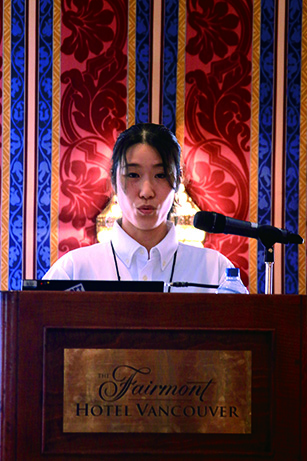
Akane Motooka
Q: Why did you choose this theme?
A: The reason was that we had a puppy who had diarrhea and was losing weight. We wanted to offer our puppy raisers healthy puppies. The staff involved in whelping and breeding discussed and found a potential solution. Based on the current situation where some dams suffer from diarrhea and weight loss, we came up with the hypothesis that if we cannot maintain the health of the dams, it would be challenging to maintain the health of the puppies that depend on their mother's breast milk, and we decided to work on this theme.
Q: What part of this research do you want people to know the most about?
A: I wanted to improve the health of the dams, but I needed more than simply increasing the amount of food to fatten them up. There are concerns about vomiting and mastitis, and some breeds tend to eat all the food served at once, which can lead to indigestion and diarrhea if they overeat. During the two months between the whelping and the return to the volunteer home, we must determine the type of food appropriate for the dam and how to feed it and keep a record of when and how much the dam eats each day. We also had to be creative in the way we provided them food. When we changed from one to two food bowls and put half the amount in each, the dog began to eat while looking at both bowls and learned to eat at different times instead of all at once. In this way, I want people to know that we need to make detailed observations, record them, and be creative with that information for subsequent trials.
Q: What was the audience's reaction to your presentation?
A: The audience was more interested in my presentation than I had imagined. The IGDF newsletter had previously introduced the free feeding of dams and puppies conducted by Guide Dogs Victoria in Australia. This study is a study we undertook based on that. When we began our study, we sent questions to guide dog organizations overseas about the actual status of free feeding. Besides Guide Dogs Victoria, which gave us some advice, we have yet to receive a response, so we assumed that no other organizations were free feeding. When I talked to the participants during a break in the presentation, I found out that several organizations were free feeding. Everyone could also share their opinions about other dams losing weight due to diarrhea, shedding, or skin eczema. It was interesting to learn that while the health of dams at whelping is a universal problem, the points of concern differ from ours.
Q: Which part of this research would you like to develop in the future or utilize in your work?
A: The health of the dams after whelping has improved a lot. The trigger was improving the puppies' health, so I would like to verify the effects on the puppies. Some puppies still have diarrhea, but my overall impression is that the health of the puppies is improving. We worked on free feeding as a research project, and now free feeding is an option for dams. It does increase the burden on our staff regarding detailed observation and record keeping, but for the health of the moms and puppies, we are proactive when moms need to be free-fed.
Q: How did you feel about attending the conference?
A: I had a hard time preparing for the presentation, especially since I had never had the experience of speaking in English for almost an hour. The International Affairs Department helped me practice a lot, not only the presentation but also technical terms and daily conversation related to guide dog training, and I successfully completed the presentation. I am grateful for that. I would have liked to have talked more with the staff of other guide dog organizations overseas. I was disappointed that I could not hear more real voices because of the hurdle of English. However, the experience of giving a presentation was a suitable stimulus. The reactions of the people who listened to my presentation gave me a boost and made me realize that I was right to work on the free feeding program.
Presentation 2
Theme
"SDGs Surfing the Diversity Generation"
Presenters
Yuko Inoue, International Affairs
Summary of Presentation
English is used at IGDF conferences and meetings, but 60% of the member organizations are non-English speaking. To solve the language barrier and make participation more accessible, I proposed to the IGDF that the burden of translation and other preparatory work be considered in its operation. In addition, we encouraged each training organization to actively participate in IGDF activities to provide quality services to guide dog users.
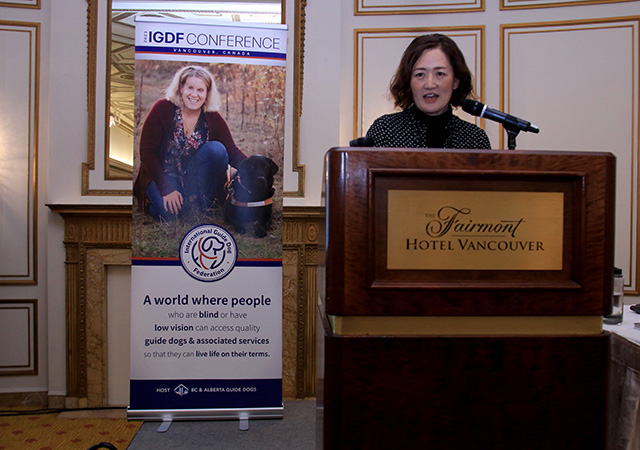
Yuko Inoue
Q: Why did you choose this theme?
A: Two members from our association are attending regular meetings as IGDF board members and assessors, so we are supporting them. I also wanted people to know that when we attend conferences and webinars such as this one, or when we share the IGDF newsletter with all the association staff, we spend an enormous amount of time and effort translating materials, etc., and that there is always a battle with time differences.
Q: What part of this research do you want people to know the most about?
A: 60% of IGDF member organizations are located in countries or regions where English is not the first language, and it takes a great effort to be active in English, the official language of the IGDF. The point is that for the IGDF to be more active, based on the 10th SDG, "Eliminate inequalities among people and countries," it is necessary to consider not only the efforts of its non-native English-speaking member organizations but also the IGDF and native English speakers.
Q: What was the reaction of the audience to your presentation?
A: The staff of the non-English-speaking affiliates in Spain, the Netherlands, Croatia, and Korea have been able to organize the current situation very well. They sympathized with us and said we should raise our voices more. Bill Thornton of BC Alberta Guide Dogs, IGDF President and the host organization of the conference, also commented, "We thought we were considering non-English speakers, but there are things we need to review more. I want to work on it positively." This presentation will catalyze a more open and active exchange of information at the IGDF.
Q: Which part of this research would you like to develop in the future or utilize in your work?
A: The guide dog industry is small, and while there are only 11 guide dog training organizations in Japan, 97 guide dog training organizations from 35 countries and regions are members of the IGDF. By actively participating in the IGDF, each organization can collect the latest information, build cooperative relationships, and communicate their efforts to provide high-quality guide dog-related services to visually impaired people worldwide. I hope that users, staff, and volunteers will continue to be aware of the quality of guide dog walking, the spread of accessibility, and the improvement of dog welfare and that they will keep their eyes on the world.
Q: How did you feel about attending the conference?
A: This was my fourth time attending the conference. It was the first time after the Covid Disaster in five years, and participants seemed to enjoy the conversation in a more open atmosphere than usual. The joy of meeting people in person rather than online filled the venue. The younger generation, who will support the guide dog industry in the future, participated in the conference, and we, the association staff, were stimulated by their participation. Of the 24 presentations, only three were from countries where English is not the native language, one of which was from JGDA. As a member of International Affairs, I followed up on the presentations of the other two, and they both did a great job. First, we prepared materials, checked the translations, memorized the text, practiced the presentation, etc. There were many steps before the day of the presentation, but we gained a great deal by presenting in front of people from overseas. I want to continue to convey the importance of looking at the world as an International Affairs member and raise my voice more from Japan.
Presentation 3
Theme
"Social Barriers Our Guide Dogs Users Face"
Presenters
Mika Anbo, Public Relations & Communications Department;
Yoshiyuki Yamaguchi, Executive Director
Summary of Presentation
Based on the results of a questionnaire survey of guide dog users, businesses that accept guide dogs, citizens, and various other organizations, we reported persistent misunderstandings about the visually impaired and access refusals. We also introduced our activities to promote guide dogs at companies, transportation facilities, schools, etc.
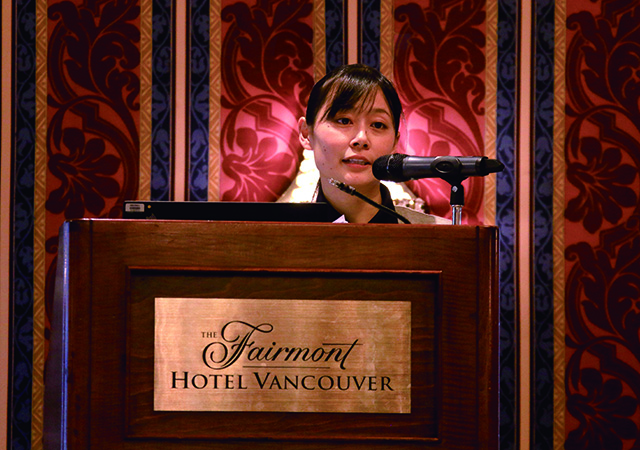
Mika Anbo
Q: Why did you choose this theme?
A: I chose this theme because I wanted to know how visually impaired people, guide dog users, and guide dogs are perceived in society, what problems guide dog users face, and what we, the Japan Guide Dog Association, can do to help. There is a concept called the social model of disability. It is the idea that disability is not on the person's part but created by society and the environment. For example, when a visually impaired person enters a restaurant, they do not think that they cannot read the menu because they are blind, but rather that the only way to know the menu is to read it printed or written on paper, creating a disability. I want to know how widespread this idea is, and I hope its further dissemination will lead to a society that is easier for guide dog users to live in.
Q: What part of this research do you want people to know the most about?
A: Physical difficulties that visually impaired people and guide dog users face in their daily lives, such as the lack of voice guidance on touch screens or the fact that only paper materials are available, are, of course, barriers, but prejudice and misunderstanding about visual impairment and guide dogs are also barriers. Access refusals are one of the most significant barriers for guide dog users. I want to make the public aware of what is happening around them.
Q: What was the audience's reaction to your presentation?
A: It would be good to inform people about the current situation of access refusals to guide dog users in Japan and our activities to promote guide dogs. Compared to other countries, I had an image that Japan is intolerant of diversity, so people would be surprised to hear that guide dog users in Japan face rejection. I was shocked to learn that access refusals was not only a problem in Japan. Also, more than I had expected, people were aware of the problem of access refusals. People in the audience introduced the initiatives they were doing in their organizations and countries, and together we worked to make the activities effective in Japan as well. In the U.K., they have developed a unique application that sends information to organizations when users enter information, such as when and where they were met with access refusals, and they are accumulating the data. Also, in the U.S., there are specialists in organizations who handle access refusals, and in France, there was a nationwide campaign to get everyone to accept guide dog users.
Q: Which part of this research would you like to develop in the future or utilize in your work?
A: When we surveyed supermarket employees, some were concerned that guide dogs were larger than they had imagined. In the subsequent seminar on acceptance, I included that kind of information as something that people on the frontline are concerned about. But guide dogs are not as much of a hindrance as you might think. There are blind and visually impaired people who wish to walk with a guide dog. And I want to think together about how everyone, including guide dog users, can live their own lives. No matter who it is, if there are any problems in using the facility, I hope we can constructively discuss how to solve them. If we can understand the gap in perceptions through surveys, etc., we can find a way to solve the problem.
Q: How did you feel about attending the conference?
A: I had difficulty presenting in English but was thrilled to meet people because of my presentation. I connected with people engaged in similar activities to promote guide dogs and exchange opinions. I also heard some interesting information, such as the application for reporting access refusals. It was worth practicing every day while listening to the audio of the presentation made by International Affairs. I was able to do it because I love this job.






